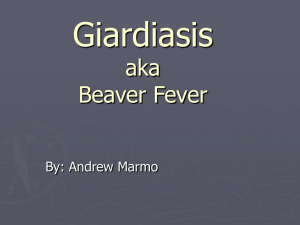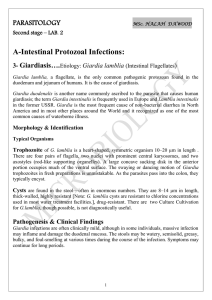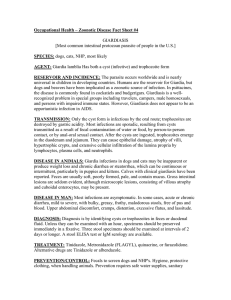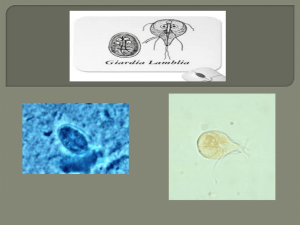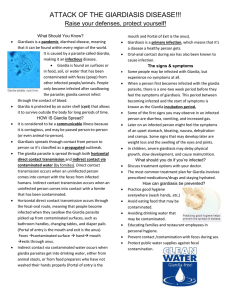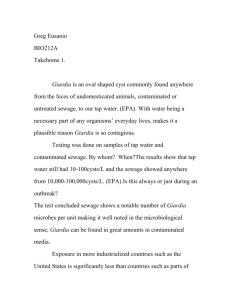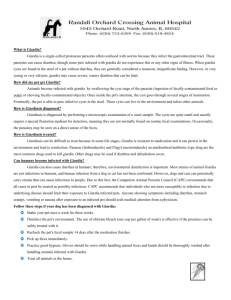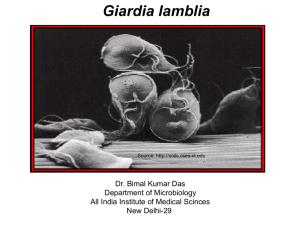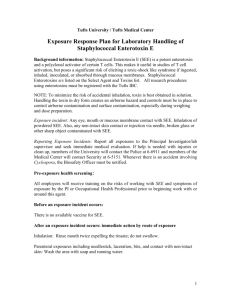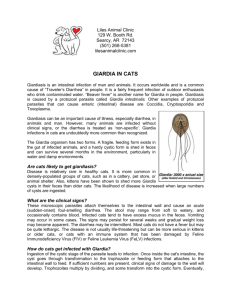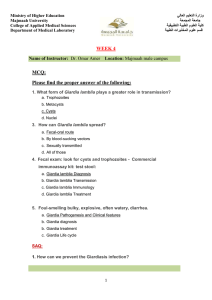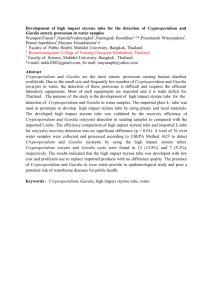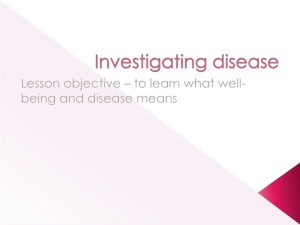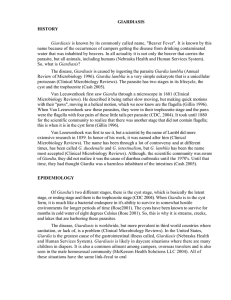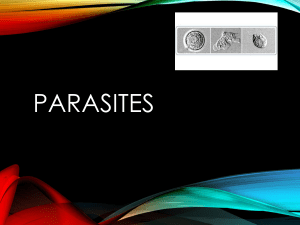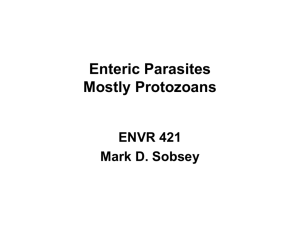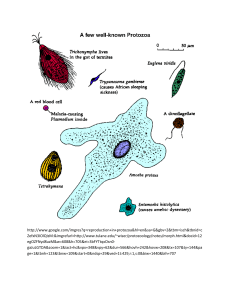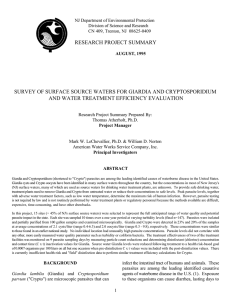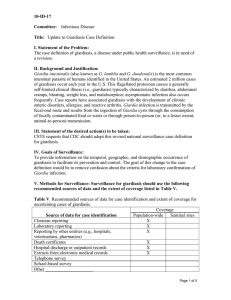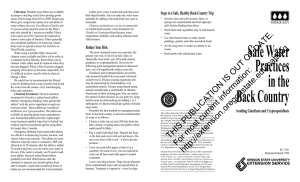giardia - Tufts University
advertisement
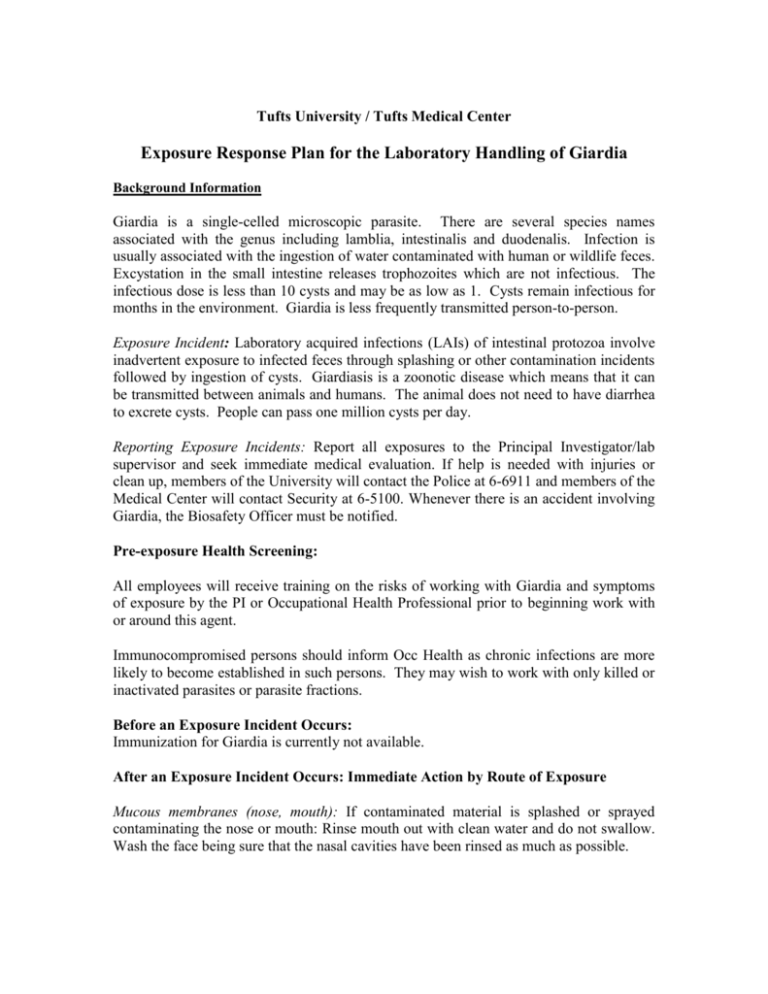
Tufts University / Tufts Medical Center Exposure Response Plan for the Laboratory Handling of Giardia Background Information Giardia is a single-celled microscopic parasite. There are several species names associated with the genus including lamblia, intestinalis and duodenalis. Infection is usually associated with the ingestion of water contaminated with human or wildlife feces. Excystation in the small intestine releases trophozoites which are not infectious. The infectious dose is less than 10 cysts and may be as low as 1. Cysts remain infectious for months in the environment. Giardia is less frequently transmitted person-to-person. Exposure Incident: Laboratory acquired infections (LAIs) of intestinal protozoa involve inadvertent exposure to infected feces through splashing or other contamination incidents followed by ingestion of cysts. Giardiasis is a zoonotic disease which means that it can be transmitted between animals and humans. The animal does not need to have diarrhea to excrete cysts. People can pass one million cysts per day. Reporting Exposure Incidents: Report all exposures to the Principal Investigator/lab supervisor and seek immediate medical evaluation. If help is needed with injuries or clean up, members of the University will contact the Police at 6-6911 and members of the Medical Center will contact Security at 6-5100. Whenever there is an accident involving Giardia, the Biosafety Officer must be notified. Pre-exposure Health Screening: All employees will receive training on the risks of working with Giardia and symptoms of exposure by the PI or Occupational Health Professional prior to beginning work with or around this agent. Immunocompromised persons should inform Occ Health as chronic infections are more likely to become established in such persons. They may wish to work with only killed or inactivated parasites or parasite fractions. Before an Exposure Incident Occurs: Immunization for Giardia is currently not available. After an Exposure Incident Occurs: Immediate Action by Route of Exposure Mucous membranes (nose, mouth): If contaminated material is splashed or sprayed contaminating the nose or mouth: Rinse mouth out with clean water and do not swallow. Wash the face being sure that the nasal cavities have been rinsed as much as possible. Inhalation: If contaminated materials are aerosolized outside of primary containment and potentially inhaled, rinse mouth twice expelling the rinsate. Do not swallow. Contact with intact skin and clothing: Remove contaminated clothing using gloves and place objects in autoclave bags. Clothing is autoclaved and then laundered. Wash contaminated skin with soap and water. After an exposure incident occurs: medical evaluation and follow-up: Following immediate post exposure actions, contact the TMC Employee Health Clinic (Boston), TCSVM Occupational Medical Clinic (Grafton) or the Mt. Auburn Occupational Health Services (Medford) and arrange for medical evaluation, diagnosis and treatment if needed. During this medical evaluation, the exposed individual may be asked to provide a stool sample, may be educated on the signs or symptoms of Giardisis, and instructed to watch for the development of these signs and symptoms. Additional stool specimens may be requested on non-consecutive days. Signs and Symptoms of Giardisis include: Symptoms typically begin an average of 7 days after becoming infected. Intestinal signs and symptoms include: diarrhea, stomach or abdominal cramping, gas or flatulence, upset stomach or nausea. If untreated, the illness may last for a few days. Some people may remain symptomatic for more than two weeks. Some infected persons are asymptomatic. Post-exposure prophylaxis: There is currently no post exposure pre-symptom prophylaxis for Giardiasis. If any individual working with or around Giardia develops signs or symptoms suggestive of exposure to Giardia, they must inform their PI and Biosafety Officer immediately. Signs and symptoms usually develop within a week (range 1-14 days) of exposure. The illness usually lasts several days but has been reported to persist for months. The individual must be evaluated at TMC Employee Health (Boston), must notify the TCSVM Occupational Health Nurse who will refer the individual to an Infectious Disease specialist (Grafton), or a physician at Mt. Auburn Hospital Occupational Health Group (Medford). Massachusetts Department of Public Health classifies Giardiasis as a reportable disease and must be reported to the Local Board of Health immediately by the attending physician. In accordance with Massachusetts regulation, any clinical laboratory identifying an infection caused by a Giardia species may be reported to the Massachusetts Department of Public Health in accordance with disease-reporting regulations. If an employee develops signs and symptoms associated with Giardia exposure in the absence of an exposure incident, the PI and Biosafety Officer shall be notified immediately. The infection will be considered laboratory-acquired until proven otherwise.
